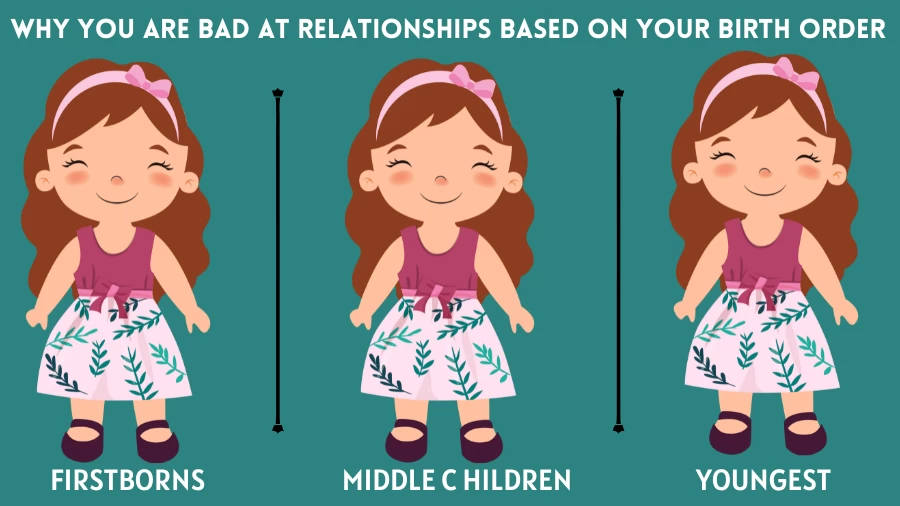Why You Are bad at Relationships Based on Your Birth Order | Personality Test
by J Nandhini
Updated Jul 29, 2023

Understanding Birth Order
Firstborns: Firstborn children often exhibit traits of leadership, responsibility, and reliability. They are used to being in charge and may prefer to take on a leadership role in relationships. However, they might also be more prone to perfectionism and being overly critical. Firstborns may struggle with sharing authority and delegating tasks, which can lead to power struggles in relationships. They might also have high expectations, making it harder for their partners to meet them.
Middle Children: Middle children are known for their diplomacy, adaptability, and peacemaking skills. They often develop strong communication abilities to navigate between older and younger siblings. In relationships, they can be empathetic and compromising. Middle children might feel overlooked or neglected, leading to a desire for attention and validation in their relationships. They may also struggle with feelings of competition or jealousy with their siblings.
Youngest Children: Youngest children tend to be more outgoing, charming, and creative. They often enjoy being the center of attention and can be spontaneous and fun-loving partners. Youngest children may struggle with a fear of inadequacy, seeking approval from others. In relationships, they might display some dependency on their partners, leading to potential conflicts over autonomy and decision-making.
Only Children: Only children often exhibit characteristics of firstborns and youngest children combined. They are typically self-confident, mature for their age, and independent due to not having siblings to interact with consistently. Only children may find it challenging to compromise or share decision-making in relationships, as they are accustomed to having things their way. They might also struggle with feelings of loneliness or a desire for constant attention from their partners.
How Birth Order Affects Relationships
Birth order can indeed have some impact on relationships, as it can influence the development of certain personality traits and behaviors. However, it's essential to remember that these effects are general tendencies and not strict rules that apply to everyone. People are unique, and various factors shape their personalities and relationship dynamics.
Here are some ways birth order might affect relationships
Firstborns:
Middle Children:
Youngest Children:
Only Children:
Overcoming Birth Order Challenges
While birth order can present certain challenges in relationships, it's essential to recognize that these challenges are not insurmountable. Here are some strategies for overcoming birth order-related challenges in relationships:
-
Awareness and Understanding: The first step is to be aware of the potential effects of birth order on your personality and relationship dynamics. Understanding how birth order might shape your or your partner's behavior can lead to greater empathy and communication.
-
Open Communication: Communicate openly and honestly with your partner about how birth order might influence your attitudes and behaviors. Discuss any challenges that arise and work together to find constructive solutions.
-
Flexibility and Compromise: Be willing to adapt and compromise in the relationship. Recognize that your partner's upbringing and birth order experiences might differ from yours, and both perspectives are valid.
-
Manage Expectations: Be mindful of your expectations for yourself and your partner. It's crucial to set realistic expectations and avoid placing undue pressure on each other to conform to birth order stereotypes.
-
Appreciate Differences: Instead of viewing birth order as a source of conflict, appreciate the unique strengths and qualities that each person brings to the relationship based on their birth order.
-
Equal Partnership: Strive for equality in the relationship. Avoid falling into traditional roles or power dynamics associated with birth order and instead focus on sharing responsibilities and decision-making.
-
Conflict Resolution Skills: Develop effective conflict resolution skills to navigate any differences or disagreements that arise in the relationship. Learning to communicate calmly and empathetically can strengthen your bond.
-
Family of Origin Awareness: Reflect on how your family of origin dynamics influenced your personality and expectations. Understanding these influences can help you address any unhealthy patterns that might arise in your relationship.
-
Seeking Professional Support: If birth order-related challenges are significantly affecting your relationship, consider seeking the support of a couples therapist or counselor. A trained professional can help you work through issues and improve communication.
-
Focus on Love and Respect: Ultimately, the foundation of a healthy relationship lies in love, respect, and understanding. Focus on nurturing these aspects, and remember that every individual is more than just their birth order.
Why You Are bad at Relationships Based on Your Birth Order | Personality Test - FAQs
While birth order can impact our personality and communication styles, it is not a guarantee of relationship success or failure. Every relationship is unique and depends on many different factors.
It's important to remember that these are generalizations and that every individual is unique. Your birth order may not fit these stereotypes perfectly, but you may still notice some of these patterns in your behavior.
Yes, birth order can impact our career choices, academic success, and other areas of our lives as well.
No, there are many other factors that contribute to our personality and relationship patterns, including genetics, upbringing, and life experiences.
No, our birth order is a fixed characteristic that we cannot change. However, we can work to overcome negative patterns associated with our birth order and embrace the positive aspects of our personality.







